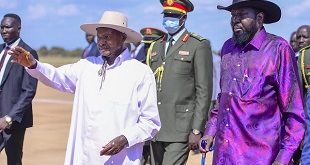
Kampala, Uganda | THE INDEPENDENT | The impacts of the new coronavirus disease-COVID-19 could be considerably higher on the urban poor living in slums where overcrowding makes it difficult to follow recommended measures such as social distancing and self-isolation.
Regular hand-washing has been highlighted as a key tool in combating the disease which has claimed 16,568 deaths mainly in Italy, China and Spain. Spreading like wildfire, the disease is devastating communities and forcing governments to enforce stringent restrictions especially on the movement of people. Uganda has so far recorded nine cases of COVID-19.
But according to data by Kampala Capital City Authority, 60 percent of the city’s population lives in slums with limited access to clean water. Amid the poor sanitation in areas of Kisenyi, Katanga, Kagugube, Kivulu and several parts of Kampala, lives are at stake as dwellers hardly follow the basic protective measures against the new coronavirus disease.
The problem is partly as a result of the cost of water and intermittent supply by National Water and Sewerage Corporation. Just this morning, Supply to the areas of Najjeera, Busibante, Kiwatule parts of Buwaate, Kungu, Bulabira and surrounding areas was interrupted to effect repairs on a faulty line. In some parts of Kampala, a jerrican of water costs up to 1,000 Shillings. The lowest it can go for in several areas is 500 Shillings, especially when supply on the national grid is interrupted.
Anna Nyokabi, a slum dweller says that residents are already struggling to find water to drink and cook food which raises doubt on the ability to wash hands frequently.
Now a team of independent experts appointed by the UN Human Rights Council in Geneva is advising governments to provide slum dwellers with continuous access to sufficient water in order to enable them to beat back COVID-19.
The experts who are not UN staff nor are they paid by the organization called on governments to immediately prohibit cuts to those people who cannot pay their water bill.
“It is also essential that they provide water free of cost for the duration of the crisis to people in poverty and those affected by the upcoming economic hardship. Public and private service providers must be enforced to comply with these fundamental measures”, the experts have said in a statement.
They added that continuous access to sufficient and affordable water could be the only intervention which will allow slum dwellers to comply with the recommendations of health institutions to keep strict hygiene measures.
“Utilities can be encouraged to maintain water and sanitation service continuity and in ensuring affordability is not a barrier to access for the urban poor”, said UN-Habitat, which is a member of UN-water.
******
URN
 The Independent Uganda: You get the Truth we Pay the Price
The Independent Uganda: You get the Truth we Pay the Price



